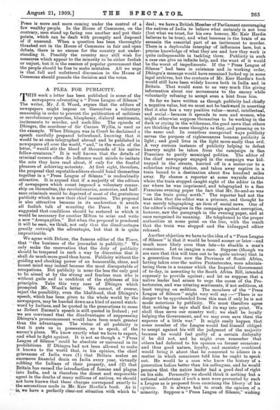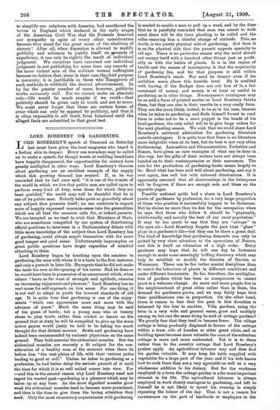A PLEA FOR PUBLICITY. T HIS week a letter has been
published in some of the newspapers advocating a "Press League of Silence." The writer, Mr. J. S. Wood, argues that the editors of newspapers might impose on themselves a voluntary • censorship in order to prevent the publication of seditious or revolutionary speeches, blasphemy, disloyal sentiments, incitements to murder, and such-like. The episode of Dhingra, the murderer of Sir Curzon Wyllie, is used as the example. When Dhingra, was in Court he declaimed a • speech carefully prepared beforehand, knowing that it would be at once telegraphed abroad and be published in newspapers all over the world, "and," in the words of the letter, "would stir the blood of thousands of his native ' fellow-creatures." It is well known that the details of criminal careers often do influence weak minds to imitate ' the acts they have read about, if only for the fearful pleasure of achieving notoriety. At first sight, therefore, the proposal that reputable editors should band themselves together in a "Press League of Silence" is undoubtedly attractive. It is argued that if a majority of the editors of newspapers which count imposed a voluntary censor- ship on themselves, the revolutionaries, assassins, and half- sane criminals would be deprived of most of the gratuitous publicity which is now their chief incentive. The proposal is also attractive because in its moderation it avoids all foolish talk of muzzling the Press. It is not suggested that conditions should be restored in which it would be necessary for another Milton to arise and write a new "Areopagitica." But when the proposal is pondered it will be seen, we think, not only that the disadvantages greatly outweigh the advantages, but that it is quite • lin practicable.
We agree with Delane, the famous editor of the Times, that "the business of the journalist is publicity." We only make the reservation that the duty of publicity should be tempered in such a way by discretion that it shall do much more good than harm. Publicity without the 'guiding and checking power of an honourable, clean, and ' honest mind may indeed become the most disreputable of occupations. But publicity is none the less the only goal to be aimed at by the strong and fearless man who is without guile and is confident of the rightness of his ' principles. Take this very case of Dhingra which prompted Mr. Wood's letter. We cannot, of course, reject the possibility, even the likelihood, that Dhingra's speech, which has been given to the whole world by the newspapers, may be handed down as a kind of sacred watch- ' word by Indians, and be quoted in the generations to come as Robert Emmet's speech is still quoted in Ireland ; yet we are convinced that the disadvantages of suppressing Dhingra's pronouncement would have been much greater than the advantages. The virtue of all publicity is that it puts us in possession, so to speak, of the enemy's plans. We know exactly what we have to expect, and what to fight against. It is not as though a "Press League of Silence" could be absolute or universal in its prohibitions. If Dhingra had not been allowed to make it known to the world that, in his opinion, the chief grievances of India were (1) that Britain makes an enormous financial drain on India every year, virtually robbing the Indians of their property, and (2) that Britain has caused the introduction of famine and plague '• into India, and is therefore the direct and responsible agent in the deaths of many millions of natives, we should not have known that these charges correspond exactly to the accusations made in Mr. Keir Hardie's book. As it is, we have a perfectly clear-cut situation with which to deal; we have a British Member of Parliament encouraging the natives of India to believe what certainly is not true (but what we trust, for his own honour, Mr. Keir Hardie believes to be true), and what becomes in the brain of an assassin the essential part of an incitement to murder. There is a deplorable interplay of influences here, but a precise knowledge of what they are and how they work is quite indispensable in tackling them. Publicity in such a case can give us infinite help, and the want of it would be the worst of impediments. If the "Press League of Silence" had been in existence and in working order, Dhingra's message would have remained locked up in some legal archives, but the contents of Mr. Keir Hardie's book would still have been widely known both in India and in Britain. That would seem to us very snuck like giving information about our movements to the enemy while voluntarily refusing to accept even a hint from him.
So far we have written as though publicity had chiefly a negative value, but we must not be backward in asserting that it also has a very positive value—moral, intellectual, and social—because it spreads to men and women, who might otherwise suppose themselves to be working in the dark or crying in the wilderness, the good news that others are thinking the same thoughts as they, and pressing on to the same end. In countless unexpected ways publicity serves the purpose of righteousness because publicity is light ; and good lives in the light more easily than evil. A very curious instance of publicity helping to defeat knavery might be taken from the campaign in San Francisco to purify municipal politics. The editor of the chief newspaper engaged in the campaign was kid- napped in the streets, hurried off in a motor-car to a suburban railway station, and taken away captive in a train bound to a destination about five hundred miles away. By chance a reporter at some wayside station where the train stopped caught sight of the editor in the car where he was imprisoned, and telegraphed to a San Francisco evening paper the fact that Mr. So-and-so was "on the train going north." The reporter had not the least idea that the editor was a prisoner, and thought be was merely telegraphing an item of social news. One of the editor's colleagues in the campaign against corruption, however, saw the paragraph in the evening paper, and at once recognised its meaning. He telephoned to the proper authorities at some point on the line, with the result that the train was stopped and the kidnapped editor released.
Another objection we have to the idea of a "Press League of Silence" is that it would be bound sooner or later—and much more likely soon than late—to shackle a man's conscience. Let us imagine a case. Suppose (though we are sure that this will turn out to be quite untrue) that in a generation from now the Provinces of South Africa, having taken over the native Protectorates, were adminis- tering them in a manner which the Imperial Government of to-day, in assenting to the South Africa Bill, intended expressly to provide against ; and let us suppose that a native leader had arisen to urge the cause of the Pro- tectorates, and was uttering sentiments, if not seditious, at least verging on sedition. The members of the "Press League of Silence" might very well say :—" There is no danger to be apprehended from this man if only be is not made notorious by publicity. We must therefore agree that nothing he says shall find its way into print. • We shall thus serve our country well; we shall be loyally helping the Government, and we may even save them the expense of a little war." It might easily happen that some member of the League would feel himself obliged to accept against his will the judgment of the majority because he would feel guilty of a certain disloyalty if he did not, and he might even remember that others had deferred to his opinion on former occasions ; and thus good nature, loyalty, and casuistry combined would bring it about that he consented to silence in a matter in which conscience told him he ought to speak out. He would be a man who knew the history of a generation before better than his colleagues, and he would perceive that the native leader had a good deal of right on his side. Personally we should think it nothing but a national misfortune if such a man were prevented by such a League as is proposed from exercising the liberty of his opinion. It is always bad to crush the opinion of a minority. Suppose a "Press League of Silence," wishing to simplify our relations with America, had smothered the voices in England which declared in the early stages of the American Civil War that the Federals deserved our sympathy in spite of every other consideration because they stood for the great cause of the abolition of slavery ! After all, when discretion is allowed to modify publicity and reticence to justify itself on grounds of expediency, it can only be rightly the result of individual judgment. We ourselves have exercised our individual judgment in not publishing for some time any records of the more violent acts of the militant woman suffragists because we believe that, since in their case the chief purpose is notoriety, it is justifiable in those whcraisapprove of such methods to withhold the desired advertisement. In by far the greater number of cases, however, publicity works extremely well. For we cannot make an absolute rule—life would be much simpler if we could—that publicity should be given only to truth and not to error. We must never forget that there are certain forms of error which can only be exposed by publicity, and that it is often impossible to sift truth from falsehood until the alleged facts are submitted to that great test.







































 Previous page
Previous page